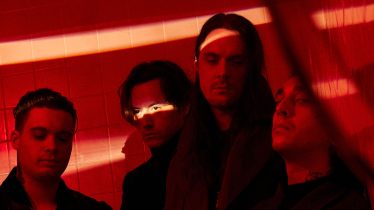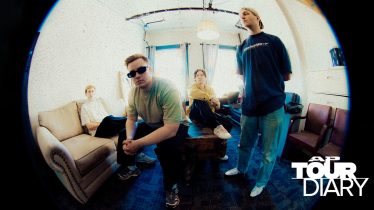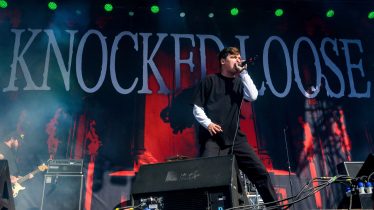The Sword
The Sword
Gods Of The Earth
[4/5]
If the Sword’s planet-leveling 2006 debut, Age Of Winters, spearheaded the “hipster metal” movement simply by virtue of its release on a New York indie-rock label, the band members didn’t become intrinsically cooler in the process. What the Sword gained from their hipster cachet, however, is the sort of exposure not usually afforded to H.P. Lovecraft-quoting nerds whose music owes as much to doom footnotes like Pentagram and Cirith Ungol as to Black Sabbath’s first four albums. Even if listeners were ironically detached in their cheerleading, they’d eventually have to accept the reality that this Austin, Texas, quartet were–and are–deadly serious about their dark arts.
As if in defiance of lightweights’ attempts to co-opt it, Gods Of The Earth cranks Winters’ burliest qualities up to 11 and blankets the pummeling in a mix (see “Lords” for a prime example) that could loosen sphincter muscles. Which isn’t to say there’s nothing for casual listeners to grab onto: Singing like Blue Cheer’s Dickie Peterson and strumming like Black Sabbath’s Tony Iommi, singer/guitarist JD Cronise buttresses his minor-key melodic moan with some of the heaviest, catchiest riffs ever put to tape. But the album’s primary footholds–those downstrokes; that kick drum; those poker-faced paeans to wizards and wenches-are as true, and as sinisterly black-and-blue, as doom metal gets. (KEMADO) Aaron Burgess
Rocks Like:
Black Sabbath’s Master Of Reality
Cirith Ungol’s King Of The Dead
High On Fire’s Death Is This Communion
IN-STORE SESSION WITH SINGER/GUITARIST JD CRONISE
Did you pay any attention to the whole “hipster metal” debate that went on during the album cycle for Age Of Winters?
I definitely heard that term bandied about. I don’t know–the idea of “hipster metal” amuses me, because people who use the term “hipster” as a serious description tend to be pretty un-hip themselves. It’s not really too offensive, though–I just thought it was kind of funny.
You’re in the clear either way with this one: There are few moves less hip than framing your album title around an obscure H.P. Lovecraft passage.
[Laughs.] Yeah, definitely.
How does that theme carry over into the rest of Gods Of The Earth?
Well, it’s not a concept album, although there’s a lot of literary influence from H.P. Lovecraft and [Conan The Barbarian creator] Robert E. Howard on it. Personally, I’d like the Sword to be the musical equivalent of Robert E. Howard, but as far as the themes go, I actually remembered after we came up with it that the title came from an H.P. Lovecraft story. It’s kind of about forgotten lore and things that in our modern society we cast aside in favor of what we think are new and better ways of doing things.
A lot of your past interviews note that you got into playing guitar through bands like Nirvana and Rocket From The Crypt. Does that sort of stuff still inform the music you write today?
It’s funny–I was definitely into that stuff more in high school, when grunge was happening, but what actually got me serious about playing guitar was finding a tape of Led Zeppelin’s The Song Remains The Same soundtrack in my parents’ collection. So, Jimmy Page is the bigger influence for my guitar playing. I might have a little bit in common with Kurt Cobain, though, as far as both of our level of skill on the guitar goes. [Laughs.]
You also seem to have a lot in common with Tony Iommi, only you’ve proved that he doesn’t have the market cornered on epic riffs.
It’s weird: Riffs have always been something that came pretty easy to me. I’m more rhythmic in my approach to the guitar; I probably should’ve been a drummer. Really, though, it’s about finding the right rhythm. The notes come pretty easily once you find the groove. –Aaron Burgess







